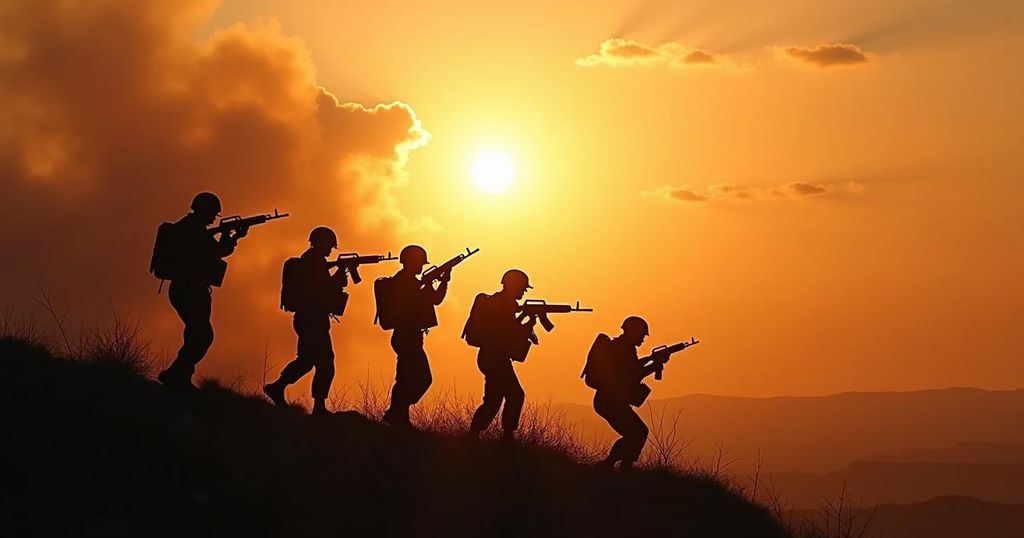Escalating Conflict: Israeli Forces Clash with Hezbollah Following Iranian Missile Attacks
Israeli troops are clashing with Hezbollah militants in Lebanon following a missile attack from Iran on Israel that has heightened fears of a broader regional conflict. Initial attacks led to significant military responses from both sides, with casualties reported amidst ongoing violence in Gaza. The actions taken by Iran and responses from Israeli forces indicate a significant escalation in the longstanding conflict, raising concerns about potential wider war in the region.
Israeli forces are currently engaged in intense confrontations with Hezbollah militants within Lebanon, following a significant escalation marked by Iran’s missile attack on Israel, which involved at least 180 missiles. This escalation of hostilities poses a significant risk of broader regional conflict, drawing various stakeholders into a complex and dangerous scenario. On Tuesday, Iranian projectiles were intercepted over Jerusalem, causing widespread panic as air raid sirens alerted citizens to shelter. In Tehran, government backers celebrated the missile strikes, chanting slogans against Israel while waving flags of Iran and Hezbollah. In retaliation, the Israeli military executed airstrikes targeting Hezbollah positions in Lebanon, claiming to have engaged militants in close-quarters combat. As the exchanges between Israeli forces and Hezbollah mounted, both sides acknowledged casualties, with reports of an Israeli soldier’s death in the latest engagements. The situation is compounded by the ongoing conflict in Gaza, where Israeli operations have resulted in substantial casualties, further inflaming tensions across the region. In light of these developments, Israeli Prime Minister Benjamin Netanyahu asserted that Iran would face serious repercussions for its actions. This statement follows a period of escalating violence that has seen more than 1,000 fatalities in Lebanon, many of whom are civilians. The grim reality of the conflict extends to Gaza, where Israeli air and ground assaults have resulted in significant loss of life among Palestinian populations. U.S. President Joe Biden expressed firm support for Israel while addressing both the immediate and potential ramifications of this conflict on a global stage. Iran, for its part, has warned of heavy retaliatory measures against any further incursions into its sovereignty stemming from Israeli military operations against its allies.
The conflict between Israel and Iranian-backed groups, particularly Hezbollah and Hamas, has been ongoing for many years, characterized by mutual hostility and periodic escalations. The recent attacks and military engagements denote a marked increase in violence, suggesting a transformation in the scale of the conflict from localized skirmishes into a potential regional war. The tensions surrounding these confrontations involve not only the immediate participants—Israel, Hezbollah, and Iran—but also broader geopolitical players, including the United States, which has continued to express support for Israel amid rising violence.
In summary, the current situation reflects a dangerous escalation in hostilities between Israel, Iran, and Hezbollah, exacerbated by the ongoing conflict in Gaza. The implications of Iran’s missile strikes and Israel’s military response are profound, suggesting a possibility of broader regional implications and further humanitarian crises as civilian populations bear the brunt of the violence. As the situation develops, the international community remains vigilant in monitoring the conflict’s trajectory and potential for expanded hostilities.
Original Source: apnews.com




Post Comment